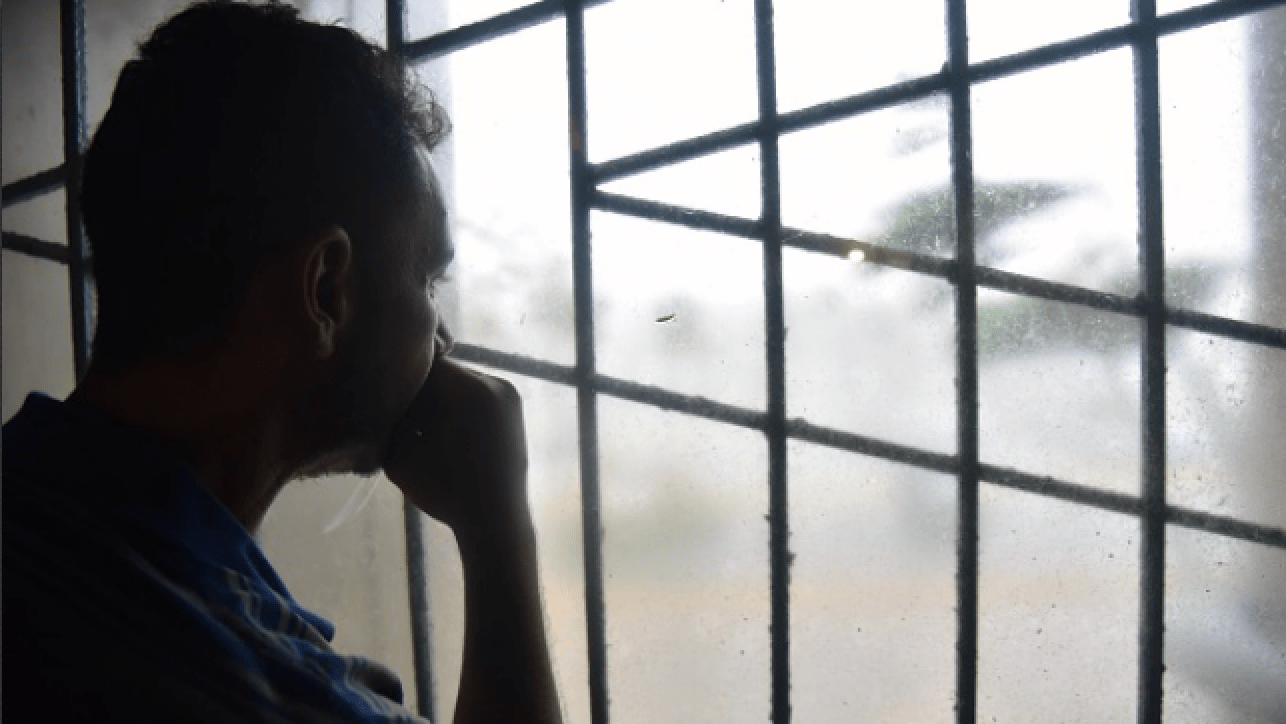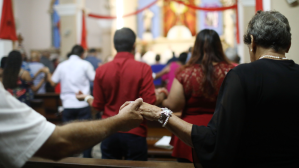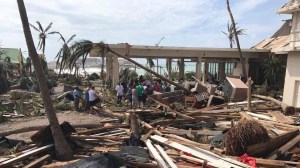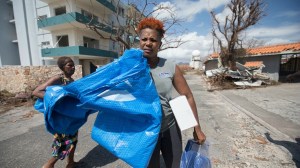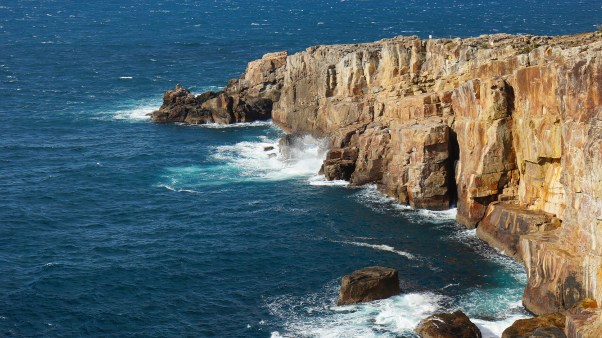In this series
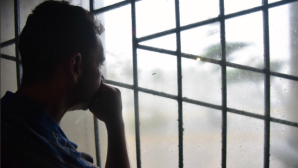
Christians across the Caribbean are turning to God during a hurricane season like no other. On Wednesday morning, Hurricane Maria landed on Puerto Rico as a Category 4 storm, the strongest to hit the US territory in at least 80 years.
The night before, pastor Gadiel Ríos prayed and read the Bible during a Facebook Live broadcast with more than 100 of his congregants, asking that God intercede to protect them and allow them to bless their island in the aftermath.
“As a congregation, we help each other during the preparation time, pray together a lot more, and help on relief efforts after the event,” said Ríos, lead pastor of La Iglesia del Centro, a congregation of about 350 in Arecibo. “The evangelical church is an ever-present force before and after these dire situations.”
Evangelicals make up about 15 percent of the population in Puerto Rico, where Catholics remain the majority, according to the Pew Research Center. Many churches, including Calvary Chapel of Puerto Rico, held special prayer nights this week to pray for their island and others in Maria’s path.
In practical ways, Caribbean churches have become better prepared for the annual threat of storms each hurricane season: Buildings are constructed to endure hurricane-force winds, forecasters can better predict a hurricane’s path, and social media networks allow congregants to quickly share warnings, pray, and coordinate relief efforts.
“We deal with the hurricane season as a ‘normal’ thing in our region, but the giant scope (size, force, rapidness of development) of Irma and Maria are just of another league,” Ríos explained by email.
Maria arrived about two weeks after Irma skirted Puerto Rico and led to widespread power outages for at least 1 million of the island’s 3.4 million residents. Some buildings, including Calvary Church of the Nazarene in San Juan, were still without power from Irma when Maria hit.
When it made landfall in Puerto Rico, Maria brought 155 mph winds, storm surges of 6 to 9 feet, and an estimated 2 feet of rain, according to CNN reports. The force of the storm was a particular threat to residents in wooden homes, coastal areas, or flood-prone regions.
“After [Hurricane Georges in 1998], our building codes were upgraded for the buildings to withstand up to 150 mph winds,” said Ríos. “Now, with the 175-plus mph of these two monsters, our constructions will require additional design, thus increasing the costs of a living that is already too expensive to manage by the average local.”
Earlier in the month, Irma pummeled nearby islands including Antigua and Barbuda, St. Martin, and Anguilla. Some smaller islands spared by the earlier hurricane withstood flooding, landslides, and significant damage with Maria, including Guadeloupe and Dominica. The string of storms have weakened the region’s capacity to assist and rebuild.
Seeing God through the storm
Ed Brown, who oversees creation care efforts for the Lausanne Movement, warns against seeing worsening storms as a result of God’s wrath.
“A balanced theology of creation care accepts that God created a world in which the events that we call ‘natural disasters’ have a normal role to play,” he said. “Hurricanes, earthquakes, volcanoes, and the like are a normal and necessary part of the natural order, and we should not see them as judgment or punishment.”
The church in the Caribbean is also better spiritually prepared to endure the storms, according to Ríos.
The country’s economic downturn has diminished the Word of Faith prosperity gospel boom that took off during the 1990s and 2000s, and he sees a shift away from efforts to “bribe” God into blessings and toward a greater understanding of a God of grace who extends blessings freely.
“This present hurricane season is bringing the people back to the biblical, sound view of God. God is sovereign, good, and merciful, but is not our servant; we are his servants,” said Ríos, also the president of ReformaDos. “Now we can understand the verses on Romans 8 regarding the days of comfort and the days of suffering: Both are his will, and both are for our wellbeing and for his glory.”
Using theodicy to help the faithful heal
Such efforts to explain God’s presence in suffering have actually been shown to help victims of natural disasters.
Researchers including Jamie Aten, founder of the Humanitarian Disaster Institute at Wheaton College, discovered that when faith traditions offer people a meaningful way to understand a tragedy, they are more likely to cope with massive material losses and regain a sense of agency amid trauma.
In an article published last year in the journal Psychology of Religion and Spirituality, the researchers concluded:
Although disasters that are particularly severe and cause substantial resource loss can elicit greater mental health distress and PTSD symptoms, to the extent that survivors can find spiritual meaning in such events, the deleterious effects of disasters on mental health functioning may be reduced.
Not only does this underscore the powerful role of spiritual meaning making in maintaining psychological well-being, but it also suggests that promoting meaning-making efforts in the survivors should be an integral part of the recovery process.
Even when Irma’s rain and winds leveled buildings and downed communications networks, Samaritan’s Purse immediately began coordinating supply drop-offs and evacuating survivors through stops in Puerto Rico and St. Martin, just 200 miles away.
Falwell’s impromptu ministry on St. Martin
A Samaritan’s Purse plane was the first humanitarian delivery to land on St. Martin after Irma earlier this month, thanks in part to efforts by Jonathan Falwell—son of the late Jerry Falwell and pastor of Thomas Road Baptist Church in Lynchburg, Virginia—who happened to be vacationing on the island when the hurricane hit. Falwell returned to St. Martin on one of several Samaritan Purse trips, just days after he left, to continue to minister to locals leading recovery efforts.
“As a pastor obviously, this is something I talk about a lot. Whether it’s through a hurricane or through a death in the family, we live in a broken world,” Falwell told CT (full interview here).
“It’s a reminder to me, an encouragement to me, that what we do—sharing the gospel of Jesus Christ—is vital,” he said. “It’s critical because Jesus is the answer to the broken world and to all the crises that we face.”
Irma recovery still in early phases
Dozens of Samaritan’s Purse staff members are still working on the ground in St. Martin, where they have distributed food, water purification kits, and other supplies.
The Adventist Development and Relief Agency (ADRA) has also dispatched relief teams across several islands. A local Seventh-day Adventist church in Antigua has helped find housing for evacuees from Barbuda, after all 1,800 residents fled.
“The general situation of many islands is still very worrying,” the Caribbean Fellowship of Evangelical Students (CARIFES) reported in a dispatch after Irma. Marc Pulvar, assistant regional secretary, asked for prayer for direction as the young Christian leaders face the aftermath of the storm and unknown plans for the rest of the school year.
Sadly, Maria has beaten away at Irma victims’ plan B: many students planned to resume classes on Guadeloupe, but the island ended up flooded earlier this week.
As CT previously reported, Christians make up more than three-quarters of the population in the islands hit hardest by Irma, and the storm destroyed numerous churches.
“I want to thank God. Despite all that’s happening globally, there is still a Christian presence in the Caribbean,” said Emerson Boyce, secretary general of the Evangelical Association of the Caribbean (EAC).
Hurricanes Maria and Irma follow Hurricane Harvey, which brought unprecedented flooding to Houston and the Texas coast.
Aten wrote for CT about what Christians have learned since Hurricane Katrina about the church’s role in disaster relief, and theologian W. David O. Taylor—whose family evacuated during Harvey—wrestled with how to cope when Jesus doesn’t calm the storm.

